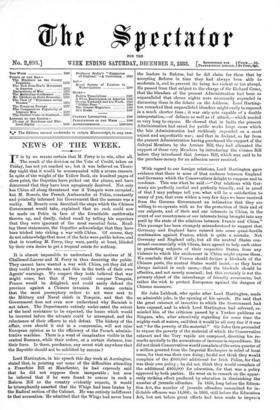Sir John Lubbock, who spoke after Lord Hartington, made an
admirable joke, in the opening of his speech. He said that the great cataract of invective to which the Government had been exposed, and to which Lord Hartington had referred, re- minded him of the criticism passed by a Yankee publican on Niagara, who, after attentively regarding for some time the mighty rush of waters, said that it would be all very fine if it was not "for the poverty of the material." Sir John then proceeded to expose the poverty of the material of which the Conservative cataract and the Tory rapids are composed, directing his re- marks specially to the accusations of increase in expenditure. He did not think Conservatives would complain of the extra quarter of a million granted from the Imperial Exchequer in relief of local rates, for that was their own doing; he did not think they would complain of the 2600,000 additional for Irish Police, for that was their own policy ; he did not think they would complain of the additional 2400,000 for education, for that was a policy approved by both parties. He went on to remark on the appar- ently striking effect produced by education in diminishing the number of juvenile offenders. In 1856, long before the Educa- tion Act, the number of juvenile offenders committed for in- dictable offences was 14,000; in 1866, still before the Education Act, but not before great efforts had been made to improve
education, it had fallen to 9,000. In 1876, it was 7,000; in 1881, 5,500; so that a steady diminution in juvenile crime goes on pan i passa with the increased attention paid to elementary
education.







































